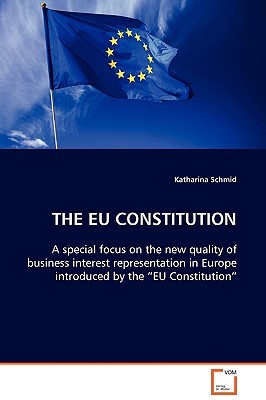
- We will send in 10–14 business days.
- Author: Katharina Schmid
- Publisher: VDM Verlag
- ISBN-10: 3639104927
- ISBN-13: 9783639104929
- Format: 15.2 x 22.9 x 0.8 cm, minkšti viršeliai
- Language: English
- SAVE -10% with code: EXTRA
Reviews
Description
As departure point for this work Katharina Schmid makes reference to the overriding importance of European Union legislation and the EU political system to all businesses operating in Europe. This book, after a preliminary analysis of the "Treaty establishing a Constitution for Europe", aims to answer the questions, in how far business interests did take part in the establishment of the "EU Constitution" and what effects the treaty would have on the system of business interest representation in Europe. In the appraisal the author distinguishes two primary factors determining the ability of business interests to exert influence. Firstly, the new balance of power between member states and the EU institutions and among the EU bodies themselves is being analysed. Following this, the system of interest representation on EU-level is looked into and possible effects of the treaty are extracted. The conclusions of this work are directed at business interest representation organisations in the EU. Yet anybody who takes interest in European integration or in how business interests enter the EU decision making process shall find answers.
EXTRA 10 % discount with code: EXTRA
The promotion ends in 21d.21:18:35
The discount code is valid when purchasing from 10 €. Discounts do not stack.
- Author: Katharina Schmid
- Publisher: VDM Verlag
- ISBN-10: 3639104927
- ISBN-13: 9783639104929
- Format: 15.2 x 22.9 x 0.8 cm, minkšti viršeliai
- Language: English English
As departure point for this work Katharina Schmid makes reference to the overriding importance of European Union legislation and the EU political system to all businesses operating in Europe. This book, after a preliminary analysis of the "Treaty establishing a Constitution for Europe", aims to answer the questions, in how far business interests did take part in the establishment of the "EU Constitution" and what effects the treaty would have on the system of business interest representation in Europe. In the appraisal the author distinguishes two primary factors determining the ability of business interests to exert influence. Firstly, the new balance of power between member states and the EU institutions and among the EU bodies themselves is being analysed. Following this, the system of interest representation on EU-level is looked into and possible effects of the treaty are extracted. The conclusions of this work are directed at business interest representation organisations in the EU. Yet anybody who takes interest in European integration or in how business interests enter the EU decision making process shall find answers.


Reviews